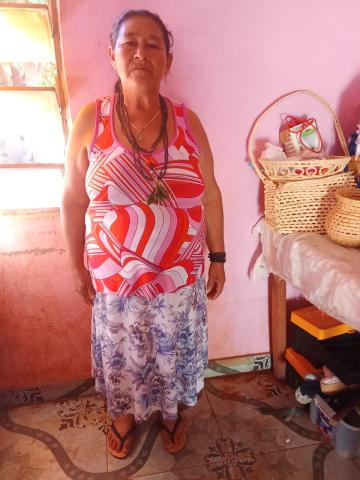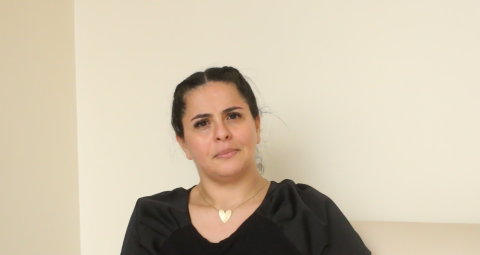Joaquina Portillo is an indigenous elderly resident from the rural community of Rio Verde, Department of Canindeyú, Northeast Paraguay. She recently attended an outpatient care day hosted in her community and was very pleased with the comprehensive care that she and her family received.
“I came with my whole family. We have several ailments, but the main one is the flu. We are very happy, they treated us all very well,” said Joaquina.

Joaquina Portillo, indigenous elderly resident from the rural community of Rio Verde, Department of Canindeyú, Northeast Paraguay. ©WHO/PAHO
The outpatient care day, one of many held locally, promotes dialogue between health care providers and indigenous and rural communities about intercultural care and provides a range of health services through outreach activities.
This activity was part of a broader project called Expanding Access to and Quality of Primary Health Care and Integrated Health Services in the XIV Health Region - Canindeyú, Paraguay, from 2023 - 2025.
Previously, indigenous communities in Northeast Paraguay have struggled to access the health services they need despite increasing rates of communicable and noncommunicable diseases. The Ministry of Public Health and Social Welfare has worked closely with PAHO/WHO, through the UHC Partnership, to expand access to and improve the quality of primary health care services at the community level, with family health teams playing a major role.
The combination of applying geospatial analysis to identify health facility gaps, the training of health workers, and strategic approaches to health system policy has led to improved equity and access to services for many remote and indigenous populations.
Access to health services increases
The inter-programmatic and interdisciplinary initiative included developing and implementing a tool for monitoring and managing health services using geospatial data about family health units, training health workers especially in the control of communicable and noncommunicable diseases, and strategic Health Situation Analysis to facilitate the design of effective health policies.
The initiative has enabled progress on multiple fronts to improve health services in Canindeyú including expanding access to health care for vulnerable populations, strengthening trust in public health services among indigenous and rural populations, increasing the technical capacity of health workers, and optimizing responses to health emergencies.
Across the Department from 2022-2024 health insurance coverage increased by 18.1% and access to health services increased by 25.1%. From April-June 2023 to April-June 2024 the number of primary care visits increased by 10.5%, and the number of overall medical consultations increased by 19%. In the same period, there was also a 29% increase in the proportion of pregnant women who received an HIV and Syphilis test during the first trimester of pregnancy.
PAHO/WHO’s Modular Essential Conditions Assessment
Created by PAHO/WHO, the ‘Modular Essential Conditions Assessment’ methodology (VCEm in Spanish) evaluates essential factors for the provision of services in health facilities. It was implemented in 14 health regions, including Canindeyú, to drive sustainable improvement within health service networks and to empower health workers. The methodology reveals significant changes that can be made with little or no investment.
“There are many activities that do not require a large investment such as providing training to health workers on protocols which can be done virtually. I believe this benefit will be reflected in fewer patients reaching critical conditions,” said Dr Angie Duarte, Director of the Curuguaty District Hospital.

Dr Angie Duarte, Director of the Curuguaty District Hospital. ©WHO/PAHO
The implementation of the modular VCEm at the Canindeyú RISS facilities identified opportunities to improve and prioritize actions to promote inclusive, equitable, and culturally appropriate health services that maintain respect for traditional medical knowledge and foster intercultural dialogue.
“The implementation of the project in Canindeyú, with the valuable support of the UHC Partnership, clearly reflects our inter-programmatic and territorial approach. This initiative was aligned with the country's efforts to advance health equity by strengthening local capacities, promoting the use of innovative technologies, and ensuring appropriate care tailored to cultural and territorial realities,” said Dr Haydee Padilla, WHO Representative to Paraguay.
“We capitalized on lessons learned from previous experiences, which allowed for a more effective and sustainable approach. Joint work with local actors and the incorporation of intercultural dialogue and community-based health care were essential in closing historical access gaps. Furthermore, the implementation of intersectoral work reinforces the positive impact of this cooperation. This experience confirms that international collaboration, aligned with national priorities, can generate real and lasting transformations in health systems,” Dr Haydee Padilla concluded.
The UHC Partnership operates in over 125 countries, representing over 3 billion people. It is supported and funded by Belgium, Canada, the European Union, France, Germany, Ireland, Luxembourg, Japan, the United Kingdom of Great Britain and Northern Ireland, and WHO.
Videos
Intercultural Dialogues in Canindeyú
